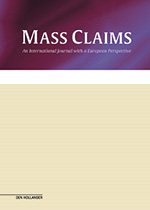Mass Claims, Communication and the Shaping of Society and Democracy
Lincoln Frakes1 Het artikel is in de opmaak van het tijdschrift rechts als pdf beschikbaar.Foreword
Spill a cup of coffee
Make a million dollars
sang Toby Keith in 2009, as he ironically listed things that make America what it is today. Referring to a fast-food customer who spilled coffee in the car on the way to work and won a large pay-out, his skepticism resonates today. Rarely does a week go by without headlines about mass claims. Without expressing a view on any particular case, it’s clear some personal injury and mass claim litigation, as portrayed in popular culture, is frivolous, trivial or abusive.
But popular culture also powerfully illustrates how mass claim litigation has become an indispensable tool in a just society. Consider the scene in the 1998 film A Civil Action depicting a distraught father’s testimony about how his son suffered from leukemia caused by pollution from an old tannery and died in the car on I-93 near the Somerville exit. Similarly, Erin Brockovich’s persistence and personal client relationships in the eponymous 2000 film about contaminated groundwater are some of the most persuasive cultural depictions of effective advocacy.
Whatever the outcome in any particular case, mass claim litigation is often controversial and disruptive. That may be especially true if the claims involve competition law. For example, European consumers may have benefited, economically and culturally, from the single markets created by competition law, harmonization and other rules. But in Tony Judt’s magisterial 2005 history Postwar, public administration, cartels and state-owned enterprises were part of the narrative that provided broad job security and helped moderates rise to power, giving everyone something to lose, pushing extremists to the margins and producing the political stability that fostered two generations of peace and prosperity, albeit at a price. Add to that Joseph Stiglitz's 2019 reminder in People, Power and Profits about competition law's early development: "Antitrust policy was not based on finely honed economic analysis. It was really about the nature of our society and democracy."
Where does all of this leave us, in an ongoing dialogue about mass claims?
I think it suggests creativity, imagination, truthful reporting and thoughtful commentary are things we can’t do without. Around the world and across jurisdictions and cultures, rules, procedures and practices are needed to dispatch easy cases quickly and to deal with tough cases expeditiously, without compromising on due process, vigorous advocacy and party autonomy. And many mass claims are tough cases. Effective communication – speaking the same language, doing the same hard thinking about seemingly intractable challenges – is a great place to start. Judges, practitioners and commentators will benefit from careful analysis as well as experience, ideas and solutions in previously unfamiliar jurisdictions or cultures.
This journal is a powerful tool to that end.


